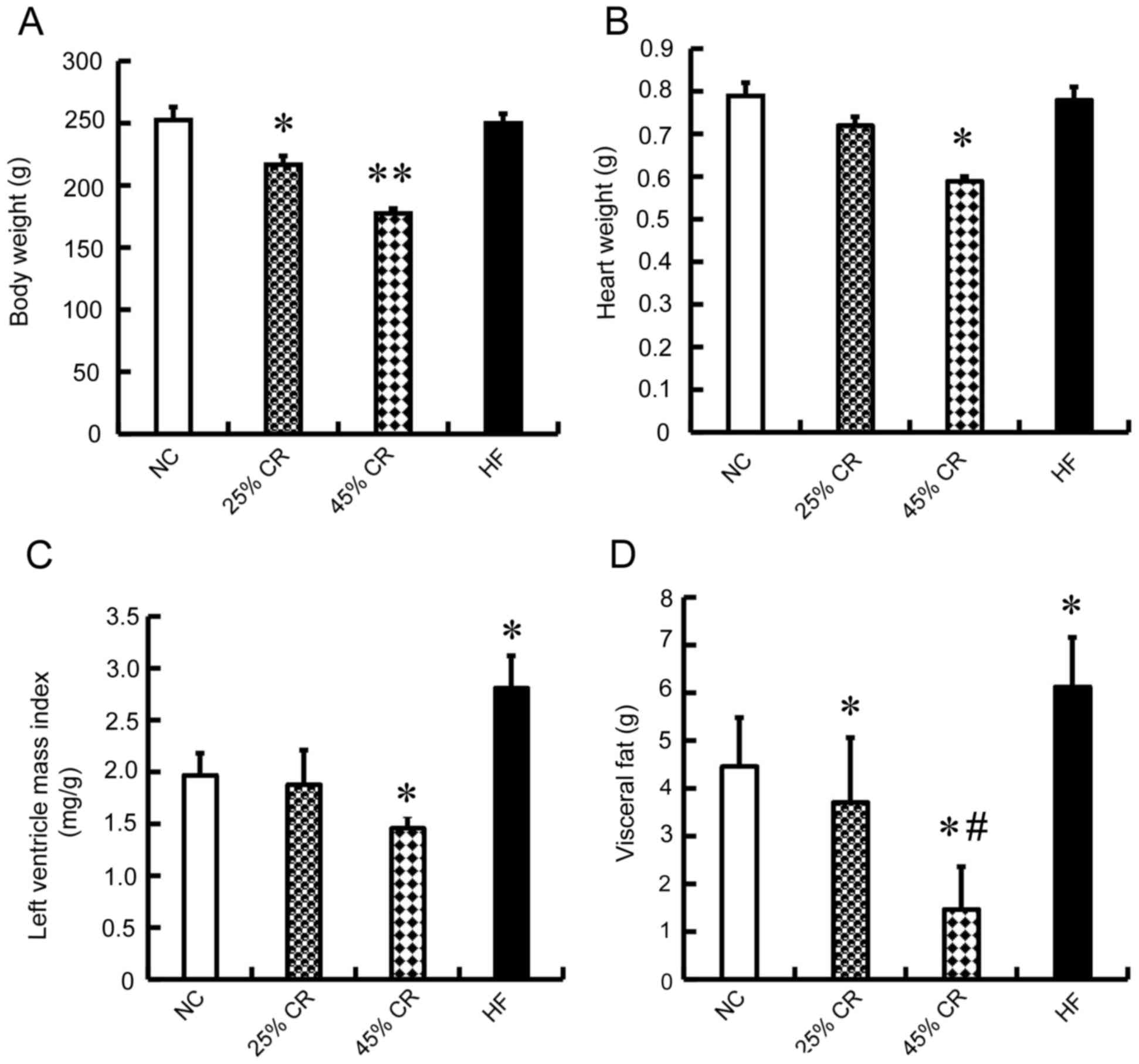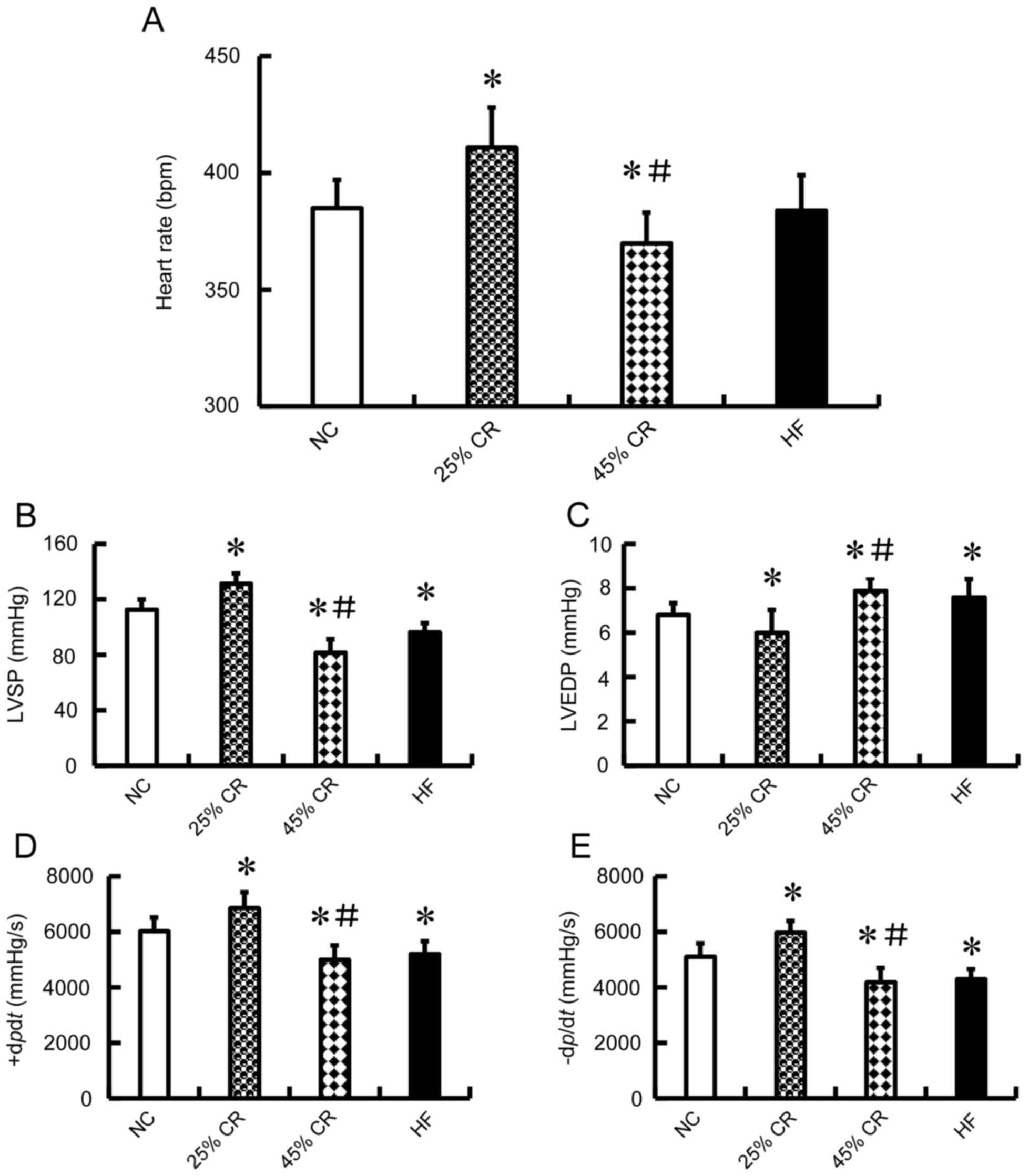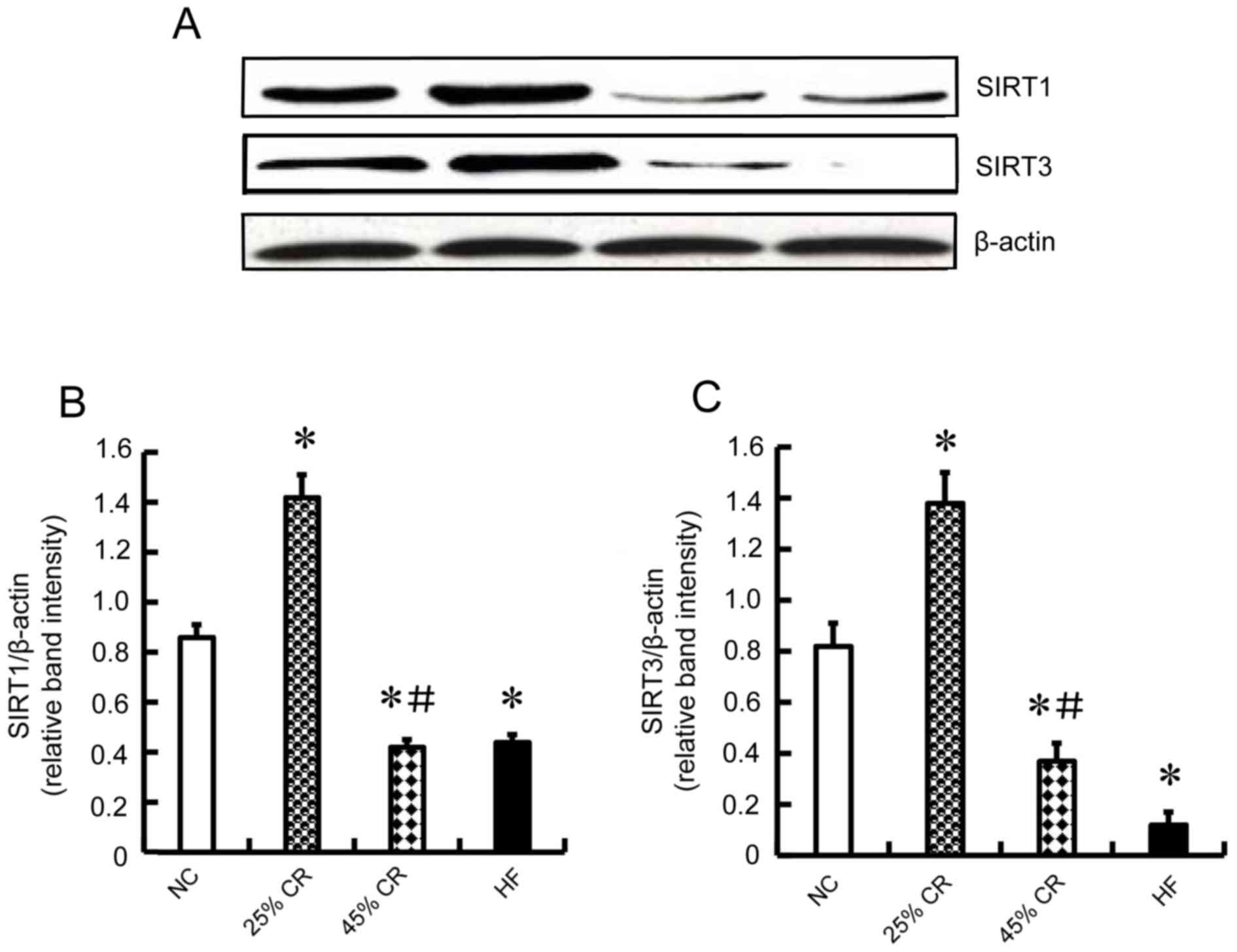|
1
|
Ginsberg HN and MacCallum PR: The obesity,
metabolic syndrome, and type 2 diabetes mellitus pandemic: Part I.
Increased cardiovascular disease risk and the importance of
atherogenic dyslipidemia in persons with the metabolic syndrome and
type 2 diabetes mellitus. J Cardiometab Syndr. 4:113–119. 2009.
View Article : Google Scholar : PubMed/NCBI
|
|
2
|
Lavie CJ, Milani RV and Ventura HO:
Obesity and cardiovascular disease: Risk factor, paradox, and
impact of weight loss. J Am Coll Cardiol. 53:1925–1932. 2009.
View Article : Google Scholar : PubMed/NCBI
|
|
3
|
Civitarese AE, Carling S, Heilbronn LK,
Hulver MH, Ukropcova B, Deutsch WA, Smith SR and Ravussin E;
CALERIE Pennington Team, : Calorie restriction increases muscle
mitochondrial biogenesis in healthy humans. PLoS Med. 4:e762007.
View Article : Google Scholar : PubMed/NCBI
|
|
4
|
Varady KA and Hellerstein MK: Do calorie
restriction or alternate-day fasting regimens modulate adipose
tissue physiology in a way that reduces chronic disease risk? Nutr
Rev. 66:1–342. 2008. View Article : Google Scholar : PubMed/NCBI
|
|
5
|
Lefevre M, Redman LM, Heilbronn LK, Smith
JV, Martin CK, Rood JC, Greenway FL, Williamson DA, Smith SR and
Ravussin E; Pennington CALERIE team, : Caloric restriction alone
and with exercise improves CVD risk in healthy non-obese
individuals. Atherosclerosis. 203:206–213. 2009. View Article : Google Scholar : PubMed/NCBI
|
|
6
|
Holloszy JO and Fontana L: Caloric
restriction in humans. Exp Gerontol. 42:709–712. 2007. View Article : Google Scholar : PubMed/NCBI
|
|
7
|
Taylor DM, Maxwell MM, Luthi-Carter R and
Kazantsev AG: Biological and potential therapeutic roles of sirtuin
deacetylases. Cell Mol Life Sci. 65:4000–4018. 2008. View Article : Google Scholar : PubMed/NCBI
|
|
8
|
Al-Regaiey KA, Masternak MM, Bonkowski M,
Sun L and Bartke A: Long-lived growth hormone receptor knockout
mice: Interaction of reduced insulin-like growth factor i/insulin
signaling and caloric restriction. Endocrinology. 146:851–860.
2005. View Article : Google Scholar : PubMed/NCBI
|
|
9
|
Fontana L, Klein S, Holloszy JO and
Premachandra BN: Effect of long-term calorie restriction with
adequate protein and micronutrients on thyroid hormones. J Clin
Endocrinol Metab. 91:3232–3235. 2006. View Article : Google Scholar : PubMed/NCBI
|
|
10
|
Potente M, Ghaeni L, Baldessari D,
Mostoslavsky R, Rossig L, Dequiedt F, Haendeler J, Mione M, Dejana
E, Alt FW, et al: SIRT1 controls endothelial angiogenic functions
during vascular growth. Genes Dev. 21:2644–2658. 2007. View Article : Google Scholar : PubMed/NCBI
|
|
11
|
Hsu CP, Odewale I, Alcendor RR and
Sadoshima J: Sirt1 protects the heart from aging and stress. Biol
Chem. 389:221–231. 2008. View Article : Google Scholar : PubMed/NCBI
|
|
12
|
Sundaresan NR, Gupta M, Kim G, Rajamohan
SB, Isbatan A and Gupta MP: Sirt3 blocks the cardiac hypertrophic
response by augmenting Foxo3a-dependent antioxidant defense
mechanisms in mice. J Clin Invest. 119:2758–2771. 2009.PubMed/NCBI
|
|
13
|
Tanno M, Sakamoto J, Miura T, Shimamoto K
and Horio Y: Nucleocytoplasmic shuttling of the NAD+-dependent
histone deacetylase SIRT1. J Biol Chem. 282:6823–6832. 2007.
View Article : Google Scholar : PubMed/NCBI
|
|
14
|
Sakamoto J, Miura T, Shimamoto K and Horio
Y: Predominant expression of Sir2alpha, an NAD-dependent histone
deacetylase, in the embryonic mouse heart and brain. FEBS Lett.
556:281–286. 2004. View Article : Google Scholar : PubMed/NCBI
|
|
15
|
Sundaresan NR, Samant SA, Pillai VB,
Rajamohan SB and Gupta MP: SIRT3 is a stress-responsive deacetylase
in cardiomyocytes that protects cells from stress-mediated cell
death by deacetylation of Ku70. Mol Cell Biol. 28:6384–6401. 2008.
View Article : Google Scholar : PubMed/NCBI
|
|
16
|
Hafner AV, Dai J, Gomes AP, Xiao CY,
Palmeira CM, Rosenzweig A and Sinclair DA: Regulation of the mPTP
by SIRT3-mediated deacetylation of CypD at lysine 166 suppresses
age-related cardiac hypertrophy. Aging (Albany NY). 2:914–923.
2010. View Article : Google Scholar : PubMed/NCBI
|
|
17
|
Wolf G: Calorie restriction increases life
span: A molecular mechanism. Nutr Rev. 64:89–92. 2006. View Article : Google Scholar : PubMed/NCBI
|
|
18
|
Cohen HY, Miller C, Bitterman KJ, Wall NR,
Hekking B, Kessler B, Howitz KT, Gorospe M, de Cabo R and Sinclair
DA: Calorie restriction promotes mammalian cell survival by
inducing the SIRT1 deacetylase. Science. 305:390–392. 2004.
View Article : Google Scholar : PubMed/NCBI
|
|
19
|
Liu L, Zhang X, Qian B, Min X, Gao X, Li
C, Cheng Y and Huang J: Over-expression of heat shock protein 27
attenuates doxorubicin-induced cardiac dysfunction in mice. Eur J
Heart Fail. 9:762–769. 2007. View Article : Google Scholar : PubMed/NCBI
|
|
20
|
Jensen MD, Ryan DH, Apovian CM, Ard JD,
Comuzzie AG, Donato KA, Hu FB, Hubbard VS, Jakicic JM, Kushner RF,
et al: 2013 AHA/ACC/TOS guideline for the management of overweight
and obesity in adults: A report of the American College of
Cardiology/American Heart Association Task Force on Practice
Guidelines and The Obesity Society. Circulation. 129 25 Suppl
2:S102–S138. 2014. View Article : Google Scholar : PubMed/NCBI
|
|
21
|
Lee M and Aronne LJ: Weight management for
type 2 diabetes mellitus: Global cardiovascular risk reduction. Am
J Cardiol. 99:68B–79B. 2007. View Article : Google Scholar : PubMed/NCBI
|
|
22
|
Bernardi R, Cosentino ER and Borghi C:
Metabolic syndrome and hypertension: Prevention and treatment.
Minerva Med. 97:123–141. 2006.(In Italian). PubMed/NCBI
|
|
23
|
Ambroskina VV, Kriachok TA, Larionov OP,
Talaieva TV and Bratus' VV: Hyperlipidemia and decrease of lipid
tolerance as factors of atherogenesis. Fiziol Zh. 53:19–28.
2007.PubMed/NCBI
|
|
24
|
Li X, Zhang S, Blander G, Tse JG, Krieger
M and Guarente L: SIRT1 deacetylates and positively regulates the
nuclear receptor LXR. Mol Cell. 28:91–106. 2007. View Article : Google Scholar : PubMed/NCBI
|
|
25
|
Yu W, Zhou HF, Lin RB, Fu YC and Wang W:
Short-term calorie restriction activates SIRT1-4 and −7 in
cardiomyocytes in vivo and in vitro. Mol Med Rep. 9:1218–1224.
2014. View Article : Google Scholar : PubMed/NCBI
|
|
26
|
Alcendor RR, Gao S, Zhai P, Zablocki D,
Holle E, Yu X, Tian B, Wagner T, Vatner SF and Sadoshima: Sirt1
regulates aging and resistance to oxidative stress in the heart.
Circ Res. 100:1512–1521. 2007. View Article : Google Scholar : PubMed/NCBI
|
|
27
|
Yu W, Fu YC, Zhou XH, Chen CJ, Wang X, Lin
RB and Wang W: Effects of resveratrol on H(2)O(2)-induced apoptosis
and expression of SIRTs in H9c2 cells. J Cell Biochem. 107:741–747.
2009. View Article : Google Scholar : PubMed/NCBI
|
|
28
|
Chen CJ, Fu YC, Yu W and Wang W: SIRT3
protects cardiomyocytes from oxidative stress-mediated cell death
by activating NF-κB. Biochem Biophys Res Commun. 11:798–803. 2013.
View Article : Google Scholar
|
|
29
|
Ahn J and Kim J: Nutritional status and
cardiac autophagy. Diabetes Metab J. 37:30–35. 2013. View Article : Google Scholar : PubMed/NCBI
|
|
30
|
Wohlgemuth SE, Julian D, Akin DE, Fried J,
Toscano K, Leeuwenburgh C and Dunn WA Jr: Autophagy in the heart
and liver during normal aging and calorie restriction. Rejuvenation
Res. 10:281–292. 2007. View Article : Google Scholar : PubMed/NCBI
|
|
31
|
Hariharan N, Maejima Y, Nakae J, Paik J,
Depinho RA and Sadoshima J: Deacetylation of FoxO by Sirt1 plays an
essential role in mediating starvation-induced autophagy in cardiac
myocytes. Circ Res. 107:1470–1482. 2010. View Article : Google Scholar : PubMed/NCBI
|
|
32
|
Sengupta A, Molkentin JD and Yutzey KE:
FoxO transcription factors promote autophagy in cardiomyocytes. J
Biol Chem. 284:28319–28331. 2009. View Article : Google Scholar : PubMed/NCBI
|
|
33
|
Nemoto S, Fergusson MM and Finkel T:
Nutrient availability regulates SIRT1 through a forkhead-dependent
pathway. Science. 306:2105–2108. 2004. View Article : Google Scholar : PubMed/NCBI
|

















